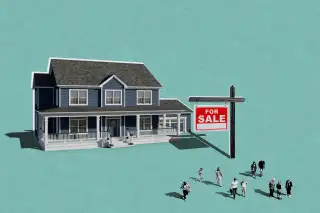Most of America Thinks It's a Bad Time to Buy a House (and They're Probably Right)

With prices climbing and supply sitting at an all-time low, it's no wonder most Americans are feeling down about the housing market.
A report released this week by Fannie Mae, a government-backed entity that buys mortgages from lenders, found that 70% of Americans say they believe now is a bad time to buy a home. The data comes from a survey of 1,006 people responsible for financial decisions for their households that was conducted in January.
Only 25% of respondents said it's a good time to buy a home — a record low.
In the same month last year, more than half of people said they felt optimistic about the housing market, with 52% of respondents indicating that it was a good time to purchase a house. On the other hand, the number of Americans who said they feel it's a bad time to buy a house surged from 37% a year ago — near pre-pandemic levels — to 70% today.
There’s reason to be pessimistic about a big real estate purchase right now. Prices are soaring thanks to booming demand caused by the pandemic and fueled by rock-bottom interest rates. Even though those low interest rates mean it’s cheap to borrow (at least for now), the huge surge in demand means that houses are in very short supply these days.
Making matters worse are ongoing supply chain issues that are causing shortages of building materials — not to mention a market that is even more competitive than usual due to a surge in real estate investors that can crowd out ordinary buyers.
The median home price in the U.S. rose to an all-time high of $365,000 last month, according to real estate firm Redfin. At the same time, the number of active listings dropped to an all-time low of 461,000. That’s 28% less than the stock of homes available in January 2021.
A large portion of Americans don’t expect to have an easier time in the market anytime soon, either: Some 43% of respondents to the Fannie Mae poll said they expect housing prices to rise over the next year. Mortgage rates are also expected to increase, which will make borrowing more expensive.
“Buyers are pouring into the market to claim a home before mortgage rates rise further as new listings slow to a trickle,” Daryl Fairweather, Redfin's chief economist, said in a recent statement. “The conditions are becoming increasingly challenging for first-time homebuyers, who will have to compete against more experienced buyers who are willing to do whatever it takes to win.”
Young Americans are struggling to buy homes
Fannie Mae’s findings were even more extreme for millennials and Gen Zers. Among respondents ages 18 to 34, 83% said it was a bad time to buy. Just 15% said it was a good time to buy.
The data bears this out: Starter homes are in especially short supply for younger buyers, and saving for a down payment takes a lot longer than it used to.
“Younger consumers — more so than other groups — expect home prices to rise even further, and they also reported a greater sense of macroeconomic pessimism,” Doug Duncan, senior vice president and chief economist at Fannie Mae, said in a news release.
If you’re struggling to buy your first home, you still have options. One study from the real estate firm RentCafe ranked Bloomington, Illinois, as the city where it's easiest to save for a down payment on a starter home. Thirteen other cities in the Midwest also made the list, along with a few larger metro areas like Washington, D.C., and Baltimore.
More from Money:
Is the Housing Market Finally Cooling? A Guide to Home Buying This Winter
Fast-Rising Mortgage Rates Are About to Make the Housing Market Even Crazier